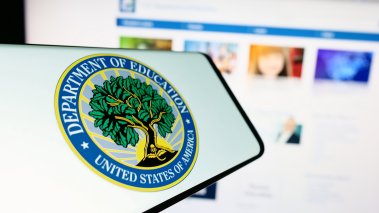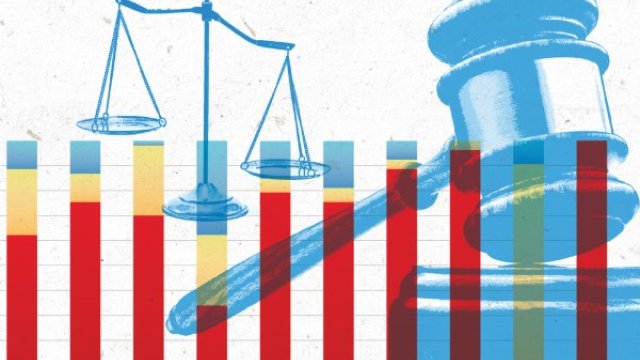Table of Contents
Department of Education’s newest ‘Dear Colleague’ letter relies on unconstitutional standards, but offers some promise

T. Schneider / Shutterstock.com
This week, the U.S. Department of Education’s Office for Civil Rights published a “Dear Colleague” letter to educational institutions accepting federal funds reminding them of their obligation to prohibit discrimination based on race, national origin, and ethnicity.
The release of the letter comes exactly one month after the Hamas terrorist attack on Israeli civilians, the Israeli military response in Gaza, and ongoing protests and clashes on campuses across the country. (FIRE takes no position on the conflict and will continue to defend the free speech rights of people on all sides of it.)
In the press release announcing publication of the new guidance, Education Secretary Miguel Cardona said, “College and university leaders must be unequivocal about condemning hatred and violence and work harder than ever to ensure all students have the freedom to learn in safe and inclusive campus communities.”
While Cardona’s quote was not included in the letter itself, government officials should be careful about declaring what institutions “must” do in order to comply with federal antidiscrimination law. That is particularly true for Secretary Cardona, who leads a Department with a troubling history of treating “Dear Colleague” letters as though they have force of formal agency rulemaking.
Secretary Cardona is right to remind colleges and universities of their obligations under federal anti-discrimination law. But when the Office for Civil Rights asks institutions to take action, it must speak precisely and recognize the First Amendment’s boundaries.
Cardona’s statement that “university leaders must be unequivocal about condemning hatred and violence” may be mere political rhetoric, expressing an aspirational goal of creating institutions that are welcoming to all. Even so, it is not an accurate statement of educational institutions’ actual legal obligations: There is no affirmative duty under Title VI of the Civil Rights Act of 1964 or any other law to condemn hatred or violence. That’s probably because “hatred” is a vague, open-ended term. Would an obligation to condemn violence require institutions to condemn both the attacks on Israeli civilians and Israel’s military response to the attacks?
For years, FIRE has sounded the alarm over unconstitutional diktats from the Department of Education, even challenging them in court. For example, earlier this year, we wrote about a settlement agreement between the department and a Georgia school district in which the department required the school to “promote diversity” in school libraries to comply with Title VI, an expansive and unsupported reading of institutional obligations under the law. Cardona’s comments may lead educational institutions to reasonably conclude the letter amounts to a new legal requirement for Title VI compliance.
Discrimination based on membership in a protected class is prohibited under Title VI
Not all discriminatory harassment that religious students face is based solely on religious practices, and it is often based on ethnic characteristics or perceived citizenship of a country with a dominant religion. As such, the “Dear Colleague” letter restates longstanding federal policy interpreting Title VI to protect students from discriminatory harassment based on “their actual or perceived: (i) shared ancestry or ethnic characteristics; or (ii) citizenship or residency in a country with a dominant religion or distinct religious identity.”
FIRE agrees with this interpretation and has repeatedly urged Congress to codify it into law. But Congress can do more to give institutions the tools they need to fully address anti-Semitic harassment and harassment targeting people of other faiths. Congress should make religion a protected class for anti-harassment purposes and explicitly grant the Department of Education jurisdiction over such cases at educational institutions that receive federal funds. This will ensure harassment targeted at students because of their religious beliefs also falls within the department’s purview.
The Department of Education continues to rely on an unconstitutional harassment definition
In its endeavor to combat actionable harassment, the Department of Education falls back to an old and unfortunate position. Specifically, it puts forth a harassment definition that unconstitutionally deviates from the standard the Supreme Court set forth in Davis v. Monroe County Board of Education in 1999. In Davis, the Court defined student-on-student harassment as targeted, discriminatory conduct which is “so severe, pervasive, and objectively offensive, and that so undermines and detracts from the victims' educational experience, that the victim-students are effectively denied equal access to an institution’s resources and opportunities.”
The letter departs from this definition, stating:
[The Department of Education’s Office for Civil Rights] interprets Title VI to mean that the following type of harassment creates a hostile environment: unwelcome conduct based on shared ancestry or ethnic characteristics that, based on the totality of circumstances, is subjectively and objectively offensive and is so severe or pervasive that it limits or denies a person’s ability to participate in or benefit from the recipient’s education program or activity.
Instead of requiring conduct to be “severe and pervasive,” the department uses a “severe or pervasive” standard — similar to the standard the Supreme Court established for hostile environment sexual harassment in the workplace in Meritor Savings Bank, FSB v. Vinson in 1986: “For sexual harassment to be actionable, it must be sufficiently severe or pervasive ‘to alter the conditions of [the victim’s] employment and create an abusive working environment.’”
Changing “and” to “or” dramatically expands what speech the standard reaches. Prohibiting objectively offensive speech that is either “severe” or “pervasive,” but not both, makes even mildly objectionable speech punishable if it is repeated.
The same goes for speech that is particularly severe but is never repeated. While such a standard may be acceptable in a workplace where smooth operation of the workflow is paramount, universities and colleges do not have the same sort of control and responsibility over students that employers have over employees. Further, the employment context is fundamentally different from the educational context: Students are expected to have open disagreements with one another and to learn from their mistakes, opportunities that an overbroad definition denies.

REPORT: New Title IX regulations bolstered due process at colleges, but Lhamon nomination threatens progress
Press Release
The letter also omits the requirement in Davis that the conduct in question “effectively bars the victim’s access to an educational opportunity or benefit.” Effective denial may include instances in which a reasonable victim-student would stay away from class or choose to withdraw from a college or university. Yet Cardona’s “Dear Colleague” letter relies on a substantially lesser standard, specifying that conduct need only be that which “limits or denies a person’s ability to participate in or benefit from the recipient’s education program or activity.” “Limits” is an awfully vague standard; it will be difficult for speakers to ascertain what speech related to race or religion might “limit” someone’s experience on campus.
Coupled with the “severe or pervasive” language, the “limits . . . a person’s ability to participate in or benefit from” provision reaches broad swaths of protected speech. If, for example, expression that is protected may serve as grounds for disciplinary investigation and punishment because it is “pervasive,” even if not “severe,” then widespread political protest may be actionable.
Secretary Cardona is right to remind colleges and universities of their obligations under federal anti-discrimination law. But when the Office for Civil Rights asks institutions to take action, it must speak precisely and recognize the First Amendment’s boundaries.
Recent Articles
FIRE’s award-winning Newsdesk covers the free speech news you need to stay informed.

Texas tramples First Amendment rights with police crackdown of pro-Palestinian protests

Here’s what students need to know about protesting on campus right now

Kansas takes a stand for intellectual freedom


